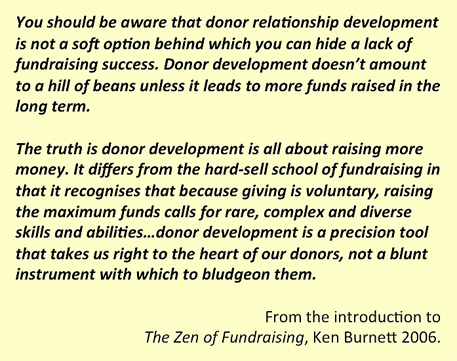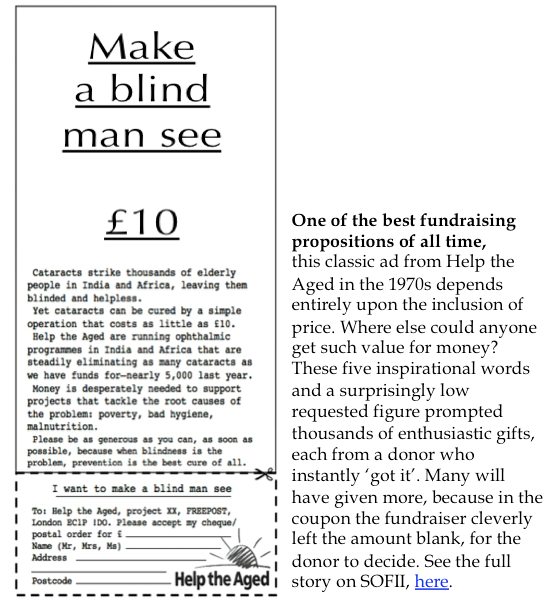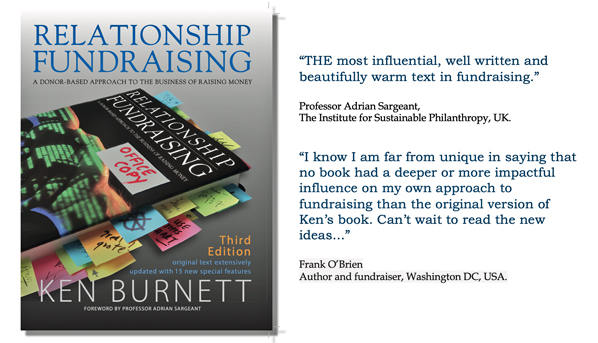|
Blog 31st May 2016. Continuing an occasional series profiling issues of interest to the Commission
Clearly fundraisers can’t function without targets that stretch them. Without money we can’t continue at all. If donors believe preoccupation with achieving your target is the main reason you’re talking to them, your chances of success will become vanishingly small. Donors must always be free to decide for themselves how much or how little they give, or whether they’ll give at all. This is not optional, it’s a fundamental human right.
|
Some years ago I squirreled away a cryptic comment from a guy called Toby Bourke, former head of donor acquisition at Greenpeace International and director of fundraising at Greenpeace UK, now CEO at Red Fundraising. It went like this.
I recently rediscovered Toby’s comment and find I like it still. The point is, you need to know where you’re going and how you’re going to get there. If you don’t, your chance of getting even close to where you want or need to be is infinitesimally small. So clearly fundraisers can’t function without targets that stretch them. Without money we can’t continue at all. Without aspiration our organisations will achieve much less than they might. We have to aim high, for the sake of everyone who needs us. But despite their usefulness – for example in events, in special appeals and in focusing community endeavour – donors, by and large, don’t like targets. They will understand their necessity of course, because they’re neither unreasonable nor stupid. But if they believe preoccupation with achieving your target is the main reason you’re talking to them, your chances of success will become vanishingly small. On the other hand, if instead you get the donor experience right, you may be surprised and delighted that you’ll raise far more than you were expecting. Fundamental principle 1 American fundraiser Shanon Doolittle puts it well when she says, ‘A donor’s heart isn’t stuffed with cash, it’s filled with passion. And that’s what you have to tap into, dear fundraisers.’ By all means calculate the money you’ll need for your appeal or the coming year and work out how you’re going to raise it. But see your financial objective in its proper place. As veteran fundraiser Harold Sumption used to say, ‘if you start by asking for money you won’t get it and you won’t deserve it.’ So it’ll pay fundraisers to be very careful about how they talk about their targets to donors, if they need to mention them at all. Asking for money should be the last thing you do after communicating appropriate information and inspiration. By then the pressure should be off, the outcome a foregone conclusion, decided by the donor. Fundamental principle 2 Targets are not the concern of donors and they shouldn’t ever be even aware of them. Instead all they should see is the cause, themselves and their part in making the required difference. Fundraisers should see targets as applying to donors collectively, in groups, rather than to any individual. Donors must always be free to decide for themselves how much or how little they give, or whether they’ll give at all. This is not optional, it’s a fundamental human right, nothing less. Fundraisers should celebrate it, not try to get round it. Donors of course also decide whether on not they’ll give a fundraiser a hearing. If fundraisers are to continue to be allowed to raise funds publicly the public’s right to say no has always to be accepted, instantly and without question. Fundamental principle 3 This needs no embellishing. Fundraisers might be advised to inscribe this principle on their heart. Passion and enthusiasm, yes. Pressure and persuasion, no. For fundraising to work it has to be all about inspiration, not at all about persuasion. Fundamental principle 4 Reaching your target shouldn’t over-ride concern for the donor. You’ll only achieve your fundraising potential if donors are happy, inspired and want to stay because, in future, fundraisers will be judged as much or even more for their skills in retention than in acquisition. So say goodbye to the philosophy that says, ‘as long as your next mailing generates more money than it costs, you can mail more’. Not if the effect of yet another mailing is to irritate legions of merely resting supporters. Continued top of column 2, above.
|
Continued from column 1, below. Fundamental principle 5 Too many fundraisers still seem to imagine they can get by without being steeped in the foundations of their craft (for craft it is). Too many still imagine they don’t need to do the homework that’s required to flourish as a fundraiser. For far too long fundraising leaders have tolerated this, in effect allowing the wrong people to remain in post. Of course there are numerous honourable exceptions to this, at all levels. Yet still fundraisers commonly come into our profession knowing nothing, are given minimal induction and exposure and leave months, or even years, later still not knowing what they need to know to properly do their jobs as donor-led fundraising professionals. No other industry would tolerate such ignorance. It’s time to change this so that fundraisers everywhere are no longer asked for the equivalent of hunting in the dark. A good place for all fundraisers to start is by familiarising themselves with the foundations of fundraising (see a list of them here on SOFII). Of course specific sums can be mentioned and shopping-list items can be included. But they must have real integrity and should be handled with care and respect for how donors see them. Integrity is everything, so specific sums should all be readily justifiable and included only as indicators to guide donors and help make their experience appropriate. Devices designed merely to up gift levels or to prompt a convenient round sum should be avoided. Ringed higher amounts and descending gift suggestions designed to lead giving may upset more donors than they influence. If a donor feels you see these techniques as steps towards your target he or she will run a mile. It makes sense to separate targets from inspiration and donors’ decisions, focusing their thoughts instead on what invariably matters most to them – the difference in this troubled world that you are helping them to make, through their gifts. So the future of the fundraising target remains secure. But only as part of an exemplary donor experience. Then, and only then, fundraisers should be held accountable for it. If this approach strikes chords with you please add your voice to the work of the Commission on the Donor Experience. Click on the logo, below. Thanks. © Ken Burnett 2016 This article first appeared on the 101fundraising crowdblog, Related earlier articles: Home page | Current blogs | Article archive Please note: though Ken Burnett was joint initiator of the Commission on the Donor Experience (with Giles Pegram CBE) and is fully committed to helping it to achieve its goals, the views in these blogs are his own.
|
|





